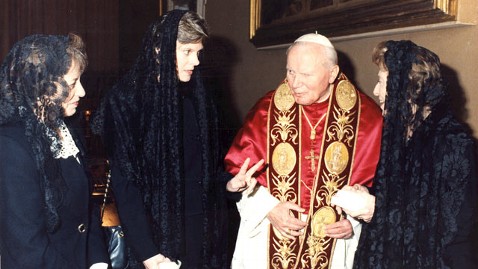Cokie Roberts Recalls Bush Visit With Pope Benedict

(Image Credit: Courtesy Cokie Roberts)
When Pope Benedict XVI visited the United States in 2008, President Bush invited me to ride in his limousine as he drove to Andrews Air Force Base to greet the pontiff. The president wanted to explain why he was breaking precedent, going to meet the visiting head of state on his arrival, rather than waiting to receive him at the White House, as is customary.
It was because of Benedict's great moral force, the president told me, that he wanted to pay this honor. I was chosen as the lucky hitchhiker because my mother, Lindy Boggs, had served as the U.S. Ambassador to the Holy See under President Clinton and Bush had visited her in Rome before his own election.
During my mother's time at the Vatican I was privileged to tag along, draped in a long black mantilla, when she presented her credentials to Pope John Paul II. My Jewish husband and I also attended a private Mass said by the pontiff at his country palace at Castel Gandolfo. It was a sun splashed morning that filled us both with a sense of intense spirituality.
I had covered John Paul's first trip to the U.S. in 1979 when he was a young, vigorous new face of the church and I had reported from Rome in 1985 when he convened an extraordinary synod of bishops. At that point there was still resistance to the pope's attempts to rein in some of the reforms brought about by the Second Vatican Council. But over the next 20 years even as John Paul grew frail and feeble, his staying power allowed him to appoint many more bishops and elevate them as cardinals - the men who would determine the next pope.
When I arrived in Rome with the much beloved pope lingering on his deathbed, Cardinal Josef Ratzinger was not the man odds makers bet on to succeed John Paul. Called by a variety of unflattering nicknames, such as "the pope's Rottweiler," the German head of the Vatican office enforcing orthodoxy was considered too controversial for the post. But by the time the conclave of cardinals came together, it took only 24 hours for the bells to ring out announcing the election of Benedict XVI. It was the triumph of conservative forces determined to stamp out dissent. To many Catholics, Benedict represented the past, not the future.
So I was curious to hear what President Bush had to say. And of course I was thrilled that my opportunity to listen would come in the executive limousine. How cool is that?
As the president made the case that the pope preached peace and justice for the poor, I had to agree. But with the priest abuse scandal rocking the American church and continued disagreements over official church positions, it struck me that Benedict's moral force might have been stronger among non-Catholics in the U.S. than with the faithful. Yes, Catholics flocked to see a papal Mass, to participate in the regal rituals. But, if public opinion polls are any indication, they saw Benedict more as a celebrity than a preacher/teacher whose dictates must be followed. The pronouncements of the Vatican on matters like birth control, gay marriage and divorce are widely ignored by American Catholics even as they go regularly to Mass and Communion.
The pope might be popular-74 percent of American Catholics said they were satisfied with Benedict's leadership in a Pew Research survey last year-but he's not heeded. And, by the way, in that same survey 83 percent said they were satisfied with the leadership of Catholic nuns, the group the pope landed on last year, giving further evidence that his views are irrelevant to many.
So, though all of the heated speculation about Benedict's successor will be interesting, the choice of the next pope will probably mean little if anything to the daily lives of lay Catholics, who will go on believing what they want to believe, further eroding the moral authority of the pope.
Unless of course the Holy Spirit surprises us and guides the cardinals to choose someone who is once again ready to open the windows of the church to let in the fresh air, as John XXIII did when he called the Second Vatican Council. That seems highly unlikely, but who knows-sometimes prayers are answered.